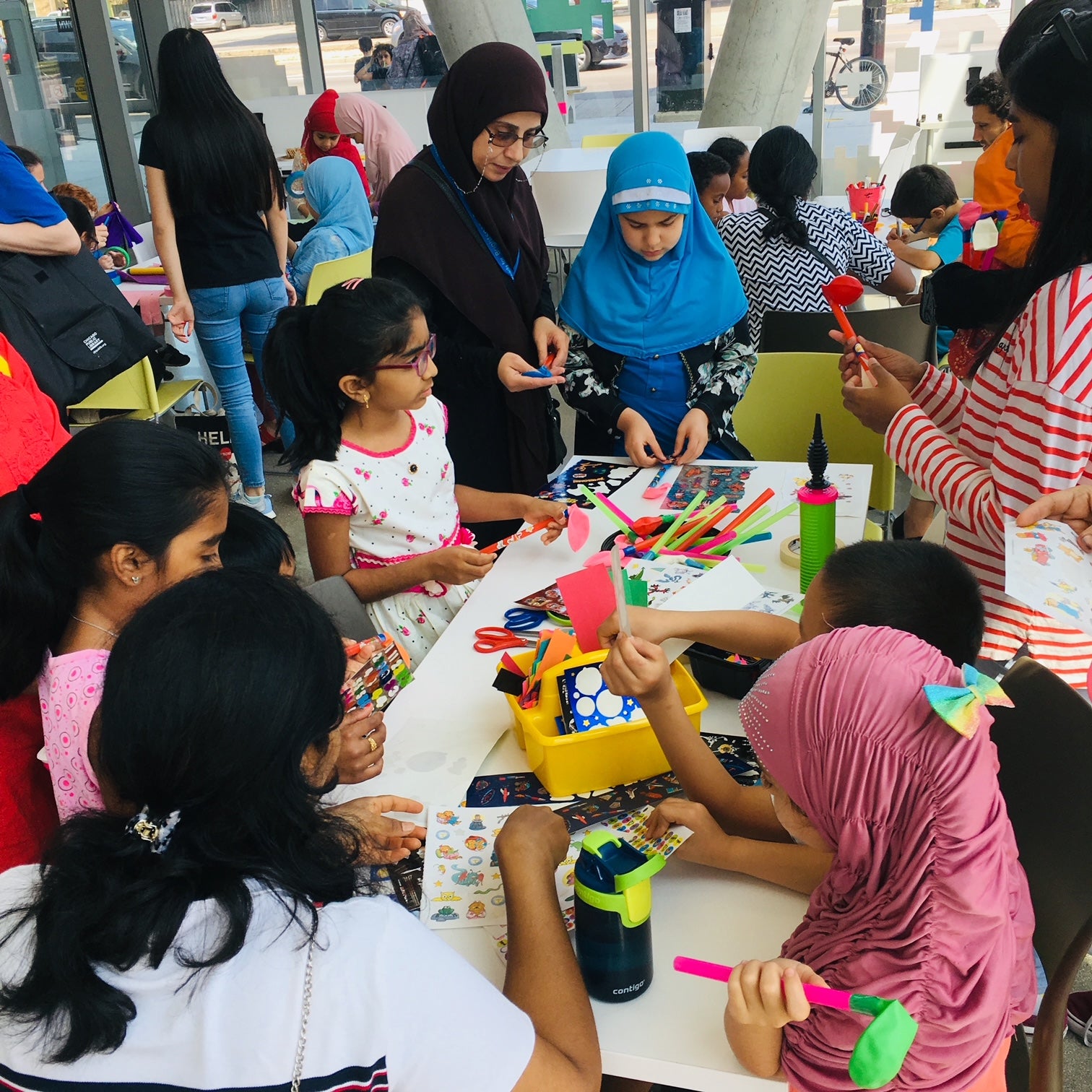By providing free and accessible summer learning activities and reading materials, even during the pandemic, public libraries have a unique role in the summer learning landscape. Libraries are one of the most trusted institutions in the communities they serve, according to Pew research. They are also one of the widest-reaching—there are more U.S. library branches than Starbucks locations, and visiting the library is the most common cultural activity for Americans, having outpaced visits to movies or sporting events by a wide margin in the pre-pandemic world.

In fact, public libraries have been providing learning materials and opportunities to youth in the summertime for over a century. This began with the distribution of Victorian-era reading lists designed to keep youth on the moral path. Today, the efforts of libraries, and their partners, have become more joyous: making available beautiful, culturally appropriate books and other resources to support young people in myriad ways, from letting them indulge in the simple pleasure of reading to helping them develop 21st century learning skills.
For over half a decade, the Urban Libraries Council (ULC) has taken a leading role in catalyzing the evolution of public libraries as essential hubs and partners for summer learning. ULC is a think and action tank of leading North American public libraries with a primary focus on advancing more positive outcomes for all youth by dismantling barriers they face, providing them with high-quality learning opportunities and strengthening local partnerships between libraries and other educational institutions.
ULC’s Leaders Library Card Challenge—which started as an Obama Administration initiative—has equipped more than 4 million K-12 students with library cards, an achievement made possible by partnerships forged between libraries, local schools and mayors and county executives. ULC’s Partners for Middle School STEM initiative aligns libraries, local governments, schools and businesses to increase high-quality STEM learning opportunities for middle grade youth from low-income families—positioning the library as a critical partner in fixing the “leaky” STEM pipeline.
ULC’s focus on building partnerships to strengthen summer learning started in 2016, when we published the Libraries Expanding Summer Opportunities leadership brief in collaboration with the National Summer Learning Association, the pre-eminent authority on summer learning in the United States. That pivotal document has directly helped to shape the ways that libraries think and go about their work to support youth during the summer—shifting from a focus on “summer reading” to “summer learning,” intentionally addressing a wide range of academic and developmental challenges.
Driving that shift is a growing recognition of the importance of summer learning for improving the lives of all youth, and the unique role that libraries can play in supporting those opportunities. Over the past two summers, the devastating impact of COVID-19 has made it more important than ever for communities to leverage the unique capacity of libraries as partners for addressing learning loss.
Combating opportunity & achievement gaps
Even before COVID-19, much research had been compiled about the widening of achievement and opportunity gaps between students from low-income families and their peers from higher-income families during the summer months. Emerging post-pandemic data now also reveals profound inequities for children who have been historically excluded, including Black, Hispanic and Indigenous youth. Research from McKinsey & Associates reported in Mind the Gap shows the disparities in access and educational equity which have created barriers to learning.
The good news is that high-quality summer learning can make a real difference for children, as research clearly shows. The National Academy of Sciences, too, recently released a study, which analyzes availability, accessibility, equity and effectiveness of summer learning experiences in conjunction with overall health, social-emotional and safety outcomes for youth.

While learning loss research underscores the importance of helping youth in Kindergarten through third grade recover or level-up reading and math skills, the further good news is that public libraries across the country are offering reading and learning programs targeted to these ages during critical out-of-school time periods, including summer. Early math, social-emotional learning and play-based programming are also part of these efforts.
Complementing these programs are workshops for parents and caregivers, offering them meaningful time to reflect on learning. Additionally, understanding that we must reduce barriers to youth learning, thousands of public libraries that serve young people living in poverty now tap federal food programs to offer meals and afterschool snacks.
In the words of Brian Bannon, Merryl and James Tisch Director for Branch Libraries and Education at the New York Public Library, “Summer is a time of immense inequities for America’s youth. The public library is uniquely poised to reach children with high-quality books, STEM and active learning activities that I have personally seen … [improve] anticipated outcomes for our youth.”
Programs such as the New York Public Library’s book and activity give-away—which provides children and teens with totes or colorful drawstring bags filled with age-appropriate books and other goodies— show how libraries continue to innovate to reach children during COVID-19 and Summer 2021. For another great example, look to The Stark District Library in Canton, Ohio, which is working with a local elementary school to provide learning activities for over 2,000 rising kindergarteners through third graders with targeted learning interventions, book ownership and meals.
Partnering for greater equity
All education institutions—and libraries are no exception—confront systemic barriers that limit opportunity, particularly for those from traditionally marginalized populations or who are living in low-income households. One obstacle facing many children and their caregivers is lack of access to the reliable transportation needed to visit library buildings and other institutions in person. A related barrier, hindering both reaching and engaging youth, is inadequate digital access. Pew research suggests that “35% of lower-income households with school-age children [do] not have a broadband internet connection at home.”
By convening and strengthening partnerships with summer and out-of-school program providers, libraries can help bring literacy and learning programs to children and families who would not otherwise have access. Relationships with park districts enable libraries to provide literacy and other educational opportunities to campers and youth living in areas where they may not otherwise have access to learning resources. Our ability to share program materials makes us a strong ally of community camps and other summer programs. And, critically, our relationships with schools allow us to align summer learning activities to school priorities.
In addition, public libraries develop partnerships with cultural institutions and with organizations across the nation to promote more equitable outcomes for young people and ensure our program content is culturally appropriate and healing. The Summer Stride program at the San Francisco Public Library, for example, involves a partnership with the local Human Rights Commission to develop deeper connections to communities where youth have been historically excluded from high-quality summer programming access. As another example, Cedar Rapids Public Library forged a partnership with Cedar Rapids Parks and Recreation’s Rollin’ Recmobile to offer unique tech learning opportunities at four parks per week throughout the summer, providing youth with access to e-readers, laptops, robotics and more.
The Urban Libraries Council continues to find ways to support the essential role of libraries in the education ecosystem. Over the past year and half, ULC’s Partnering with Schools action team has been researching and working on tools to help libraries across the nation rethink and recommit to partnerships with their local school districts, including aligning library work to efforts to help children and teens accelerate their learning after the instructional losses caused by the pandemic. In June, the Urban Libraries Council supported the development of the National Summer Learning Association’s Discover Summer web app, which is designed to help families nationwide locate accessible summer learning opportunities in their local communities, including public library programming.
“Public libraries are uniquely positioned to help all kids rise and close … [education] gaps,” said the National Summer Learning Association’s president and CEO, Aaron Dworkin. “It’s going to take the enormous energy and heart of us all, working together to make a meaningful difference.” Luckily, many tools and models to activate these opportunities already exist. The Wallace Foundation has given out-of-school and summer providers a toolkit to develop vigorous summer learning programs that help build equity and develop strong outcomes. Libraries can play a critical partner role through each phase of this toolkit—from recruiting youth, strengthening academics and enrichment opportunities, offering safe and resource-rich learning sites, filling staffing gaps and supporting program planning. Together with libraries, summer learning program providers can drive deep, meaningful and equitable outcomes for youth that will last a lifetime.
Photos courtesy of Urban Libraries Council and Chicago Public Library.




